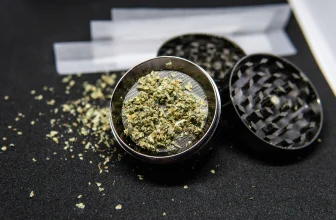
What is CBD?
CBD, or cannabidiol, is a natural compound derived from the cannabis plant. It is one of the many cannabinoids found in the plant, but unlike THC (tetrahydrocannabinol), CBD does not have psychoactive properties. This means that it does not produce the “high” associated with marijuana use.
CBD has gained significant attention in recent years due to anecdotal evidence of its potential therapeutic effects. According to an article by Silver, CBD interacts with the body’s endocannabinoid system, which is crucial in regulating various physiological processes such as pain perception, mood, appetite, and immune function.
The most common source of CBD is hemp, a variety of cannabis with low THC levels. CBD products are available in various forms, including oils, tinctures, capsules, creams, and even cbd treats for dogs all with varying concentration and purity. As CBD research continues to evolve, it is essential to stay informed about its potential benefits and limitations.
Are CBD Treats For Dogs Effective?
CBD dog treats have emerged as a potential solution for addressing various health issues in dogs. The question that every pet parent wants to be answered is “Do CBD dog treats work?” There is scarce research done on CBD efficacy, however, the few studies done have shown positive outcomes.
Anecdotal evidence suggests that hemp products may be effective for certain canine health conditions. According to a study conducted by Kogan et al, pet owners reported positive outcomes, stating that hemp products were moderate to highly effective in reducing anxiety, pain relief, helping with sleep, and better overall well-being in their dogs.
The effectiveness of these treats may depend on several factors such as the dog’s individual health condition, size, breed, and dosage. However, it’s essential to exercise caution and conduct due diligence before using CBD dog treats.
What Are The Possible Effects of CBD Treats?
The effects of CBD in dogs have not been researched scientifically, and the FDA has not approved its use or provided a dosing guideline. According to Cornell University College of Veterinary Medicine, CBD treats may offer a range of potential effects for dogs.
Some of the commonly reported effects of CBD treats in dogs include;
- Anxiety relief
- Pain and inflammation management
- Seizure control in dogs with epilepsy
- Anti-nausea in dogs experiencing gastrointestinal issues
- Cancer treatment
- Arthritis treatment
- Improved allergies
- Improved mobility Issues
While these potential effects are promising, it’s crucial to remember that individual responses can vary, and not all dogs will experience the same benefits. Additionally, as with any supplement or treatment, CBD treats may have side effects, albeit typically mild, including;
- Drowsiness
- Lowered blood pressure
- Dry mouth
Frequently Asked Questions
Does It Take a Long Time for the Effects of CBD Dog Treats to Work?
The timeframe for CBD dog treats to take effect is a common query. The response varies based on factors like dosage, your dog’s individual metabolism, and the specific CBD product used. Typically, effects may become noticeable within 30 minutes to an hour.
What Are the Possible Effects of These Treats?
CBD dog treats may provide various benefits, such as relieving pain and reducing anxiety. However, individual responses vary, and it’s crucial to monitor your pet for any potential side effects, as well as the desired positive effects.
Are There Any Serious Side Effects?
CBD dog treats are generally considered safe, but side effects can occur, including drowsiness or diarrhea. Monitoring your pet closely during initial use is advisable, and if unusual symptoms persist, consult your veterinarian.
Rough Guidelines for Giving CBD Treats to a Dog
Commence with a low CBD dosage and gradually increase it based on your dog’s response. It’s prudent to adhere to the manufacturer’s dosing recommendations for the specific CBD product. Consulting your veterinarian for personalized guidance is always a wise choice.
Should I Consult My Veterinarian?
Speaking with your veterinarian before introducing CBD treats or chews for dogs into your pet’s routine is highly recommended. This is particularly important due to CBD’s potential impact on liver enzymes and the need for tailored advice, especially if your dog has underlying health issues or is taking other medications.
What Things Should I Avoid When Using These Treats?
Ensure that the CBD product you choose is formulated for pets and free from harmful additives. Avoid using CBD meant for humans, and opt for full-spectrum CBD oil for its potential therapeutic effects.
Are There Red Flags to Watch Out for in CBD Treat Companies?
When selecting CBD treats for your dog, be vigilant about the reputation of the company, look for third-party lab testing, and scrutinize ingredient lists for transparency. Be cautious of companies making unsupported health claims.
Do CBD Treats Help with General Anxiety?
CBD treats for dogs may assist in alleviating general anxiety, but responses vary. Consult your veterinarian for guidance on proper usage.
How About Thunderstorms? Do CBD Treats Help with Separation?
CBD treats for dogs may help reduce anxiety related to thunderstorms or separation, but results differ among dogs. It’s vital to introduce the treats before the stressful event and consult your veterinarian for comprehensive anxiety management strategies.
Conclusion
In conclusion, CBD treats hold promise for promoting the well-being of your canine companion. However, it is essential to approach CBD use for pets responsibly and with an understanding of its potential benefits and limitations. It is not a one-size-fits-all solution and individual responses can vary.
Before incorporating CBD treats into your dog’s routine, talk to your veterinarian to ensure they are appropriate for your pet’s specific needs. Additionally, always purchase high-quality CBD products from reputable sources to minimize the risk of contaminants or low-purity substances.
References
- Deabold, K. A., Schwark, W. S., Wolf L., Wakshlag J.J. (2019). Single-Dose Pharmacokinetics and Preliminary Safety Assessment with Use of CBD-Rich Hemp Nutraceutical in Healthy Dogs and Cats. Animals (Basel). 9(10):832. https://pubmed.ncbi.nlm.nih.gov/31635105/
- Kogan, L., Hellyer, P., & Rishniw, M. (2019). US Veterinarians’ Knowledge, Experience, and Perception Regarding the Use of Cannabidiol for Canine Medical Conditions. Frontiers in Veterinary Science, 5, 429875. https://doi.org/10.3389/fvets.2018.00338
- Kogan, L. R., Hellyer, P. W., & Robinson, N. G. (2016). Consumers’ perceptions of hemp products for animals. Frontiers in Veterinary Science. 42, 40-8. https://www.frontiersin.org/articles/10.3389/fvets.2018.00338/ful
- Di Salvo, A., Conti, M. B., & della Rocca, G. (2023). Pharmacokinetics, efficacy, and safety of cannabidiol in dogs: An update of current knowledge. Frontiers in Veterinary Science, 10, 1204526. https://doi.org/10.3389/fvets.2023.120452
- CBD: What you need to know about its uses and efficacy. (n.d.). Cornell University College of Veterinary Medicine. Retrieved August 1, 2023, from https://www.vet.cornell.edu/departments-centers-and-institutes/riney-canine-health-center/canine-health-information/cbd-what-you-need-know-about-its-uses-and-efficacy#:~:text=One of the first CBD,be more comfortable and active.
Silver R. J. (2019). The Endocannabinoid System of Animals. Animals: an open access journal from MDPI, 9(9), 686. https://doi.org/10.3390/ani9090686






